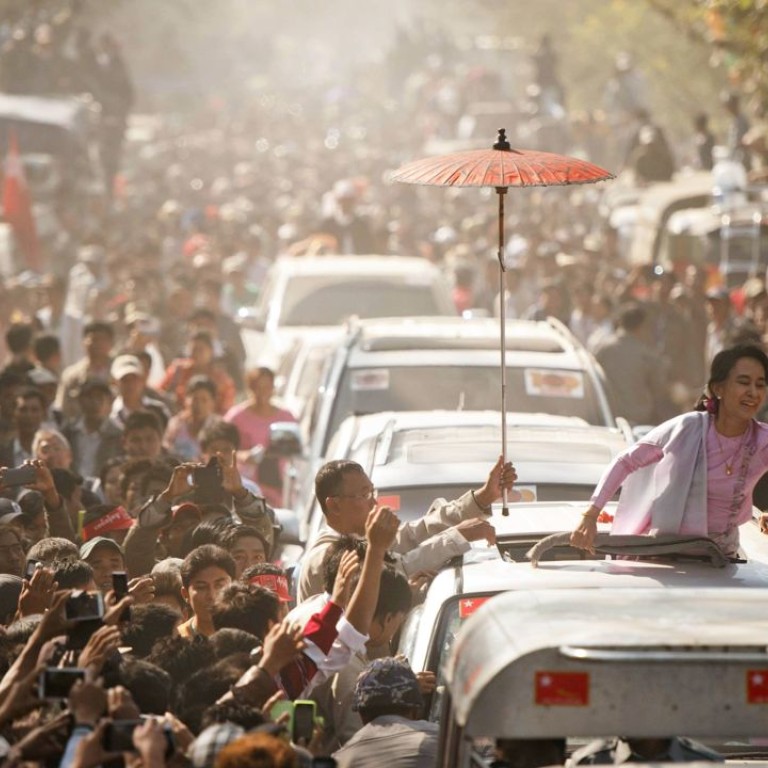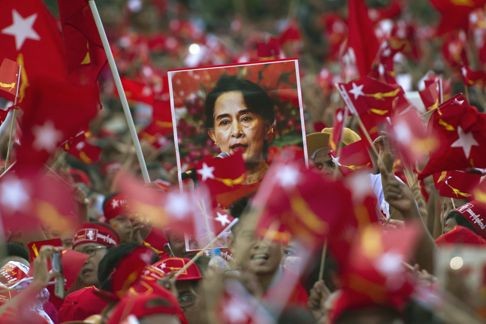
Myanmar faces dilemma to balance need for Chinese investment against voters’ desire for cleaner government
Aung San Suu Kyi’s National League for Democracy must chart a different course from ruling military proxy – the Union Solidarity and Development Party – which followed decades of corrupt dictatorship
Doing business in Myanmar has never been a straightforward practice for Zhang Qiang, a jade mine investor from Yunnan province’s Ruili township, which borders the Southeast Asian country.
“Gratuity fees are usually a prerequisite,” Zhang said, referring to the money – often somewhere between a few thousand yuan to tens of thousands of yuan – he has paid Myanmese officials and middlemen in order to get business deals there.
Read more: Revealed: Myanmar’s US$31 billion jade mining industry and its ‘ties to country’s elite’
Like many other jade mines that have Chinese investment, Zhang said his operation in Myanmar’s northern Kachin state was causing problems as a result of lax government scrutiny.
“The Chinese mine jade is destroying the environment, and I have no choice but to do the same because everyone is doing it.”
China’s investment will be welcome… but it will be held to much higher standards than before
This may soon change. A newly elected government – almost certainly to be led by Aung San Suu Kyi’s National League for Democracy (NLD), which has just won a landslide victory– will seek to chart a different course from the ruling military proxy – the Union Solidarity and Development Party (USDP), when it takes office next year.

Aung San Suu Kyi already has the people’s support. Therefore she has the flexibility to handle Myanmar’s relationship with China from the perspective of her country’s interests
“Under the old Burmese regime, issues to do with the environment and labour were less important, but they will rise quite a bit under the new government,” said Sean Turnell, an economist at Macquarie University in Australia and an adviser to Suu Kyi.
“China’s investment will be welcome; I don’t think the NLD will be hostile, but it will be held to much higher standards than before.”
There could even be a reboot of the bilateral relationship under the new leadership, while Myanmar would look to sell its agricultural products to the immense Chinese market, Turnell said.
Chinese investment has touched a nerve with many in Myanmar, more so than elsewhere in the region.
At its peak, it played not only an important role in the country’s economy – reinforcing frustrations over a long-held perception of a vassal state to its giant neighbour – but was also widely resented for fuelling corruption, causing environmental degradation and ignoring the local population’s voices.
Read more: Suu Kyi’s party wins historic majority in Myanmar election
In 2011, public discontent forced the quasi-military government under outgoing President Thein Sein to suspend the construction of the Myitsone Dam, a controversial project funded and mostly carried out by a Chinese state-owned company.

Many people also view the snub as a sign that Myanmar was pulling itself away from China’s orbit, as it opened the door to Western governments and investment after decades of isolation and military dictatorship.
“Chinese investment in Myanmar has not fully recovered since then,” said Michael Davis, Asia director of Global Witness, a non-profit organisation that investigates corruption and environmental wrongdoings.
To add to Beijing’s frustrations, the operation of the Letpadaung copper mine project – a joint venture between a Chinese state-owned company and Myanmar’s government – was halted in 2012 amid protests and a deadly police crackdown.
In 2014, Myanmar decided to ditch another major project, a proposed US$20 billion railway line linking Yunnan with Myanmar’s Rakhine state, citing “public demand”.
Despite these setbacks, China remains a major source of direct foreign investment.
As the push to attract international investment has floundered in the past four years, the new government will be under greater pressure to achieve what its predecessor has failed to do.
“The sweeping prediction that Myanmar will be a fabulous frontier for Western investment so far has been a little bit misplaced,” Davis said.
“So a new government coming in will want to attract foreign investment, generate economic development, and China will be an important part of that.”
Backed by a strong public mandate, Suu Kyi and her new government would have more breathing space than their predecessors to make decisions that serve the country’s interests best, said Sun Yun, a senior associate at the East Asia programme at the Stimson Centre, in the United States.
“Thein Sien and his government had to make a gesture to China because he was under pressure to prove to the people he was on their side – he needed the people’s approval,” Sun said. “But this is not an issue for Suu Kyi; she already has the people’s support. Therefore she has the flexibility to handle Myanmar’s relationship with China from the perspective of her country’s interests.”
In 2013, Suu Kyi chaired a parliamentary commission investigating the Letpadaung copper mine project and recommended the operation go ahead, despite concerns about its social and environmental damages.
However, China would still be troubled by the possibility of an unpredictable new leadership in the Myanmar capital, Naypyidaw, Sun said.
“Beijing has been confident that, as Myanmar’s biggest neighbour and an important economic partner ... it has strong political bargaining power. But on the other hand, it still worries that Myanmar will continue to adopt policies unfavourable to Beijing, such as getting closer to the United States,” Sun said. “The fears outweigh the confidence.”
While Beijing is likely to wait for the new government to make the first move before adjusting its approach, how Suu Kyi and the NLD will handle hot-potato projects, such as the Letpadaung copper mine and the Myitsone dam will be closely watched, the analysts said.
Convincing Chinese investors that they are still welcome in Myanmar will be tricky, as the public mandate could be a double-edged sword. While allowing Suu Kyi more room to manoeuvre in her dealings with testy projects, the immense public expectations also made any perceived failure or backsliding more politically damaging for the new government, Davis said.
“No government in Myanmar, whether military or civilian, is going to want to antagonise China,” Davis said. “Strategically it’s never going to make any sense.
“At the same time, the dramatic election victory of NLD is one spectacular manifestation of the population in Myanmar that is emboldened to demand all kinds of changes and expect their voices to be heard.”
As public opposition persists, many see little hope that the Myitsone dam project – situated at a culturally and geographically important confluence on the Irrawady river – can ever be resumed.
Turnell said: “You are never going to get the Burmese government to back it now, it’s symbolically really problematic.”
Suu Kyi has been careful when commenting on the dam project. Last year, she blamed Thein Sein for leaving the issue unresolved and passing the buck to the next government by suspending the project until the end of his term.
However, the company behind the project, the China Power Investment, has not given up trying to reverse the Myanmese government’s decision.
Jiang Lizhe, of the public affairs division of the CPI subsidiary in charge of the dam project, said in a written reply to the South China Morning Post that the company had expanded its engagement with the general public since the suspension and had received more “recognition, understanding and support” for its efforts.
“Our goal is to try our best to resume the Myitsone dam’s construction and to listen to sound suggestions [we receive] along the way,” Jiang said.
Thein Sien’s decision to suspend the project had dampened the confidence of many Chinese and other international investors, Jiang said.
“We have high expectations of the new government and the company will carry on fulfilling its contractual and social responsibilities in accordance with the two countries’ laws and agreements.”
Turnell said the company’s insistence had irritated many Myanmese. “One thing the Chinese government could usefully do is to tell the company involved that it’s really a problem, and don’t keep pushing on that,” Turnell said.
However, Sun said the Chinese company was increasingly aware of the high chance that it would not be able to finish the project.
“What comes next is how to clean up the mess,” Sun said. “This is negotiable.”
Like many major infrastructure projects in Myanmar and elsewhere in the world, the Myitsone dam is a top-down deal secured by agreements between the two governments.
To draw lessons from the incident, Davis said some Chinese companies doing business abroad had in recent years begun to embrace the idea of engaging with the public and were trying to be more transparent. “But there is still a long way to go,” he said.
Dealing with a highly corrupt business environment would also present a big test for the next Myanmese government, Davis added.
“[It] is the legacy of 50 years of a highly corrupt junta government. If they [the next government] do what their predecessors have done ... it probably will be far more damaging for them, because a lot of people who voted for the NLD voted for the vision they represent – a clean form of government.”
